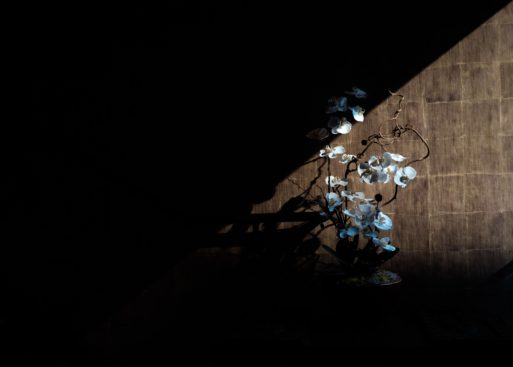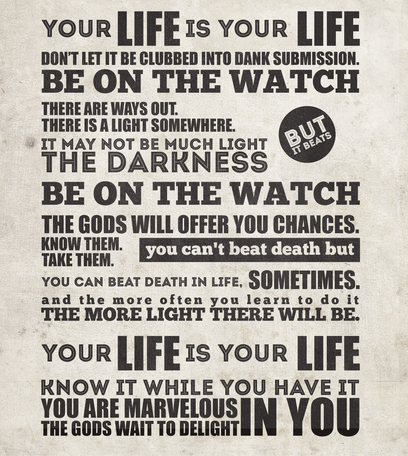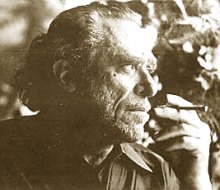 American poet Charles Bukowski (1920-1994) is well-known in the literary world as an irreverent, tell-it-like-it-is kind of writer who spoke his truth — his whole truth — even when it was overtly opinionated, and especially when it would offend the sensibilities of his time. Bukowski is less known for his tender side, hard-won by a life that led him down dark corridors to face his shadow side — completely wrecked on cigarettes and booze, heartbroken, and in love with life despite it all. Written in 1993 and published posthumously by Black Sparrow Press in 1996, his poem “The Laughing Heart” is a testament to the clarity that he found at the end of his life.
American poet Charles Bukowski (1920-1994) is well-known in the literary world as an irreverent, tell-it-like-it-is kind of writer who spoke his truth — his whole truth — even when it was overtly opinionated, and especially when it would offend the sensibilities of his time. Bukowski is less known for his tender side, hard-won by a life that led him down dark corridors to face his shadow side — completely wrecked on cigarettes and booze, heartbroken, and in love with life despite it all. Written in 1993 and published posthumously by Black Sparrow Press in 1996, his poem “The Laughing Heart” is a testament to the clarity that he found at the end of his life.

Visual rendering of “The Laughing Heart” by Charles Bukowski
(Credit: fluxcomb.wordpress.com)
“The Laughing Heart” opens with a clear, certain declaration that “your life is your life.” Beginning with the awareness of personal autonomy, Bukowski entreats us to step fully into our own lives. The next statement is considerably darker, heavy with the awareness that life must assert itself if it is to be fully expressed in the world we were born to: “Don’t let it be clubbed into dank submission.” The admonition, “be on the watch” against the life-denying powers-that-be demonstrates an awareness that being comfortable all the time is to be sleepwalking through life — a state that is more than accessible to the average citizen of 20th century America, and indeed encouraged by all the products and services designed to make life easier. Bukowski may also be referring to the politic of fear that has been used to keep the American public agreeable to the many restrictions of movement and invasions of privacy brought upon the average person under the guise of public safety measures. That there are “ways out” of this swamp of confusion is reassuring at least and enlivening at best.

American poet Charles Bukowski
(Credit: wikimedia.org)
There is indeed “a light somewhere,” as Bukowski, who is known as the “laureate of American lowlife” (Time, 1986), can attest. The simple yet elegant juxtaposition between “light”/”darkness” and “life”/”death” serves to illuminate the space between opposites in which he invites us to travel the truth of ourselves. This is the victory of deep living: to “beat death in life.”
So what does beating “death in life” look like, and why should we strive for this in favor of a complacent and comfortable life? Transcending the practicalities of caring for our mortal bodies while we have them, Bukowski declares what we have always known in our heart of hearts that when the night comes, sleep is elusive, and there is the urge to sing or dance. We are “marvelous” beings, with a massive capacity to feel, to know, to create our own reality and bring forth a more beautiful world for ourselves and each other. “The gods,” whoever they might be — out there or within us — “wait to delight in” us. This delight, beyond safety and too luminous for words, is the essence of life, the light in the dark, and the celebration that awaits us in every moment, should we dare to open ourselves to the world.

 “The Laughing Heart” by Charles Bukowski
“The Laughing Heart” by Charles Bukowski


 “In Case You Don’t Live Forever” by Ben Platt
“In Case You Don’t Live Forever” by Ben Platt
 Our Monthly Tip: Make an “In Case of Death” File to Ease Loved One’s Grief
Our Monthly Tip: Make an “In Case of Death” File to Ease Loved One’s Grief
 Passing of Beloved Comedian Births a New Comedy Festival
Passing of Beloved Comedian Births a New Comedy Festival















what book is that poem from? Thx
Report this comment
Hi Robert,
I had to do a little digging but learned that the poem is in an anthology of poems titled “The Laughing Heart” published by Black Sparrow Press in 1996. I was able to locate a copy online at Abe Books.com if you’re interested. Here’s a link.
https://www.abebooks.com/first-edition/Laughing-Heart-Bukowski-Charles-Black-Sparrow/3666688134/bd.
Report this comment